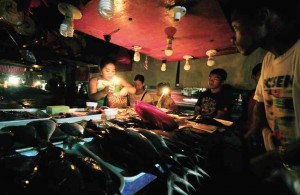Power outages lead to more crimes in Mindanao
DAVAO CITY, Philippines—The authorities here and in other places in Mindanao have noted a spike in criminal activity in the wake of hours-long power outages even during the night.
In this city for example, the police chief, Senior Superintendent Vicente Danao Jr., said crime increased by almost 45 percent during the first quarter of the year compared with the same period last year.
He said from January to March, the period when power outages started affecting the city and other places in Mindanao areas, the police recorded at least 58 crimes each day. This was in contrast to the 32 day recorded during the same period last year.
Majority of the more than 4,000 crimes the police recorded during the first three months of the year were crimes against persons and property such as robbery, theft and homicide.
Danao said the police suspect that the rotational power interruptions, lasting up to 7.5 hours here, were a major factor in the increase in criminal activity, including robbery.
Article continues after this advertisementDanao said security devices such as closed-circuit television cameras were useless during power outages.
Article continues after this advertisement“Zero visibility. You cannot see in the dark even if you have a generator,” he said.
Danao said one counter-measure the authorities have come up with has been to increase police visibility.
“I myself conduct patrol, too,” he said.
Colonel Casiano Monilla, chief of the military-led Task Force Davao, said his men have also been helping the police prevent crime by deploying in strategic areas of the city.
At least 17 Task Force members also join patrols around the city, he said.
“We have these motorcycle teams,” Monilla said.
Mayor Rodrigo Duterte said to beef up the capability of the police and the Task Force, the city government planned to hire nearly 1,000 more people to join community watches.
Each newly hired community watch member would be paid P6,000 per month and would be trained in peacekeeping. They might also be issued firearms, he added.
“We have to give them more police power. It’s written in our book that whoever assists the mayor in the peace and order maintenance will also become an agent of a person in authority. I will give them authority to apprehend or what is better,” he said.
In Cotabato City, police and military authorities said they were also joining hands to prevent crime, including a possible resurgence in kidnap-for-ransom activities due to the power outages.
“This is a united effort to quell acts of lawlessness and terrorism that may occur at night while we are experiencing sectional brownouts,” Colonel Dickson Hermoso, spokesperson of the 6th Infantry Division, said.
Hermoso said Cotabato City police director Senior Superintendent Rolen Balquin also agreed to conduct joint weekly meetings to assess peace and security issues.
Ramil Masukat, head of the Radio Emergency Communication Network (Recon), a watchdog body, said they will also help authorities monitor and prevent crime.
Recon members are equipped with VHF radio sets to report crime to the authorities as it takes place, he said.
The power outages were also giving election officials in Kidapawan City a serious headache.
Diosdado Javier, the local election officer, said the power outages have taken a heavy toll on the ongoing voter registration.
Javier said on Tuesday that the local Commission on Elections managed to process only 31 applications out of the scores of people who flocked to their offices.
Kidapawan City suffers from up to six hours of daily power interruptions.
Javier said the Comelec central office has yet to respond to his request for a standby generator.
Power consumers in Davao del Sur have been spared from the interruptions so far.
The Davao del Sur Electric Coop. said it uses modular generator sets to boost the power supply in the province.
But Godofredo Guya, Dasureco manager, said the electric coop can only do so much.
“If the power supply continues to go down, power interruptions could also occur in the Dasureco service areas,” he said.
The National Grid Corp. of the Philippines said it is now on red alert status due to the declining power supply.
On its website, NGCP said Mindanao’s power supply was 873 megawatts as of 8 a.m. Thursday but the peak demand was 1,227 megawatts, a shortfall of 354 megawatts.
The declining power supply is due to the failure of State Power Inc. to put its power plants in Misamis Oriental back on line, and the reduced output of the Pulangi and Agus hydropower plants.
RELATED STORY
